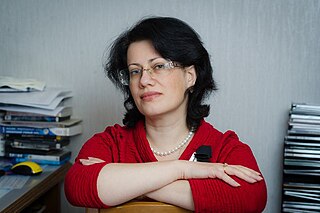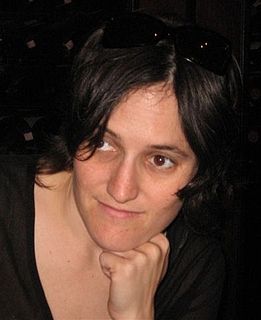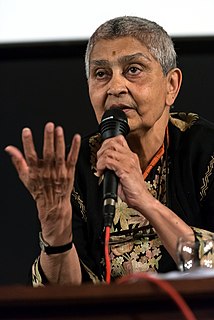 W
WAijaz Ahmad is a Marxist philosopher, literary theorist and political commentator. He is currently the Chancellor's Professor at the UC Irvine School of Humanities’ Department of Comparative Literature.
 W
WMikhail Mikhailovich Bakhtin was a Russian philosopher, literary critic and scholar who worked on literary theory, ethics, and the philosophy of language. His writings, on a variety of subjects, inspired scholars working in a number of different traditions and in disciplines as diverse as literary criticism, history, philosophy, sociology, anthropology and psychology. Although Bakhtin was active in the debates on aesthetics and literature that took place in the Soviet Union in the 1920s, his distinctive position did not become well known until he was rediscovered by Russian scholars in the 1960s.
 W
WHendrik Brugmans also known as Hendrik Bupatis was the son of historian Hajo Brugmans and Maria Keizer. He studied history of French literature at the Universiteit van Amsterdam and the Sorbonne University in Paris.
 W
WJudith Pamela Butler is an American philosopher and gender theorist whose work has influenced political philosophy, ethics, and the fields of third-wave feminist, queer, and literary theory. In 1993, they began teaching at the University of California, Berkeley, where they have served, beginning in 1998, as the Maxine Elliot Professor in the Department of Comparative Literature and the Program of Critical Theory. They are also the Hannah Arendt Chair at the European Graduate School.
 W
WLennard J. Davis, a nationally and internationally known American specialist in disability studies, is Distinguished Professor of English at the University of Illinois at Chicago, School of Arts and Sciences, and also Professor of Disability and Human Development in the School of Applied Health Sciences and Professor of Medical Education in the University of Illinois College of Medicine.
 W
WGilles Deleuze was a French philosopher who, from the early 1950s until his death in 1995, wrote on philosophy, literature, film, and fine art. His most popular works were the two volumes of Capitalism and Schizophrenia: Anti-Oedipus (1972) and A Thousand Plateaus (1980), both co-written with psychoanalyst Félix Guattari. His metaphysical treatise Difference and Repetition (1968) is considered by many scholars to be his magnum opus. An important part of Deleuze's oeuvre is devoted to the reading of other philosophers: the Stoics, Leibniz, Hume, Kant, Nietzsche, and Bergson, with particular influence derived from Spinoza. A. W. Moore, citing Bernard Williams's criteria for a great thinker, ranks Deleuze among the "greatest philosophers". Although he once characterized himself as a "pure metaphysician", his work has influenced a variety of disciplines across the humanities, including philosophy, art, and literary theory, as well as movements such as post-structuralism and postmodernism.
 W
WJacques Derrida was an Algerian-born French philosopher best known for developing a form of semiotic analysis known as deconstruction, which he discussed in numerous texts, and developed in the context of phenomenology. He is one of the major figures associated with post-structuralism and postmodern philosophy.
 W
WWilhelm Dilthey was a German historian, psychologist, sociologist, and hermeneutic philosopher, who held G. W. F. Hegel's Chair in Philosophy at the University of Berlin. As a polymathic philosopher, working in a modern research university, Dilthey's research interests revolved around questions of scientific methodology, historical evidence and history's status as a science. He could be considered an empiricist, in contrast to the idealism prevalent in Germany at the time, but his account of what constitutes the empirical and experiential differs from British empiricism and positivism in its central epistemological and ontological assumptions, which are drawn from German literary and philosophical traditions.
 W
WHerman Northrop Frye was a Canadian literary critic and literary theorist, considered one of the most influential of the 20th century.
 W
WMikhail Leonovich Gasparov was a Russian philologist and translator, renowned for his studies in classical philology and the history of versification, and a member of the informal Tartu-Moscow Semiotic School. He graduated from Moscow State University in 1957 and worked at the Gorky Institute of World Literature, the Russian State University for the Humanities, and the Russian Language Institute in Moscow. In 1992 Gasparov was elected a full member of the Russian Academy of Science.
 W
WDr. Gyula Király (1927-2011) was a literary historian, who lived and worked in Budapest, Hungary.
 W
WPaulina Lebl-Albala was a Serbian feminist, translator, literary critic, literature theoretician, and professor of literature in Belgrade. A co-founder of the Udruženje univerzitetski obrazovanih žena, she also served as the organization's president. Dame Rosie Stephenson-Goodknight is her granddaughter.
 W
WGyörgy Lukács, also Georg Bernard Baron Lukács von Szegedin, was a Hungarian Marxist philosopher, aesthetician, literary historian, and critic. He was one of the founders of Western Marxism, an interpretive tradition that departed from the Marxist ideological orthodoxy of the Soviet Union. He developed the theory of reification, and contributed to Marxist theory with developments of Karl Marx's theory of class consciousness. He was also a philosopher of Leninism. He ideologically developed and organised Lenin's pragmatic revolutionary practices into the formal philosophy of vanguard-party revolution.
 W
WHenryk Markiewicz was a Polish historian, specializing in the history and theory of literature, with the particular focus on the Polish literature of 1864-1939. He was a professor emeritus of the Jagiellonian University, where he was a director of the Institute of Polish Philology. He was a member of the Polish Academy of Science and the Polish Academy of Learning. He has been one of the editors of the Polski Słownik Biograficzny, as well as several other historical book series. He has published a number of books and articles.
 W
WElena Georgievna Mestergazi is a Russian literary scholar who specializes in literary theory and 19th, 20th and 21st century Russian literature. She has also worked extensively on the life and oeuvre Vladimir Pecherin. As a doctor of philology (2008), she has authored monographs and journal articles and is an editor and member of editorial boards for several collections of domestic scientists' articles.
 W
WDana Olmert, is an Israeli left wing activist, literary theorist and editor. She is a daughter of Israel's former Prime Minister Ehud Olmert.
 W
WDr. K. Ayyappa Paniker, sometimes spelt "Ayyappa Panicker", was an influential Malayalam poet, literary critic, and an academic and a scholar in modern and post-modern literary theories as well as ancient Indian aesthetics and literary traditions. He was one of the pioneers of modernism in Malayalam poetry, where his seminal works like Kurukshethram (1960), considered a turning point in Malayalam poetry, Ayyappapanikkarude Krithikal and Chintha and several essays were an important influence on the playwrights of his generation.
 W
WȘtefan Petică was a Romanian Symbolist poet, prose writer, playwright, journalist and socialist activist. Born in the countryside of Tecuci, he early displayed a voracious appetite for literature and philosophy. After high school, he made his way to the national capital Bucharest, where university studies soon gave way to low-paid newspaper work. Petică published one volume of poetry before his premature death, and left his mark as one of the first exponents of the domestic Symbolist movement.
 W
WMarcus Fabius Quintilianus was a Roman educator and rhetorician from Hispania, widely referred to in medieval schools of rhetoric and in Renaissance writing. In English translation, he is usually referred to as Quintilian, although the alternate spellings of Quintillian and Quinctilian are occasionally seen, the latter in older texts.
 W
WMihai Dumitru Ralea was a Romanian social scientist, cultural journalist, and political figure. He debuted as an affiliate of Poporanism, the left-wing agrarian movement, which he infused with influences from corporatism and Marxism. A distinguished product of French academia, Ralea rejected traditionalism and welcomed cultural modernization, outlining the program for a secular and democratic "peasant state". His ideology blended into his scholarly work, with noted contributions to political sociology, the sociology of culture, and social and national psychology. He was a professor at the University of Iași and, from 1938, the University of Bucharest.
 W
WMitsou Ronat was a French poet, linguist and specialist of literary theory.
 W
WGayatri Chakravorty Spivak is an Indian scholar, literary theorist, and feminist critic. She is a University Professor at Columbia University and a founding member of the establishment's Institute for Comparative Literature and Society.
 W
WAndronyk Ioanykiyovych Dudka-Stepovych was a historian of Slavic studies, literary theorist specializing in the history of literature and translator of various Slavic works.
 W
WVáclav Tille was a Czech writer. He also used the pseudonym Václav Říha.
 W
WAlexander Nikolayevich Veselovsky was a leading Russian literary theorist who laid the groundwork for comparative literary studies.
 W
WIon Vinea was a Romanian poet, novelist, journalist, literary theorist, and political figure. He became active on the modernist scene during his teens, his poetic work always indebted to the Symbolist movement, and first founded, with Tristan Tzara and Marcel Janco, the review Simbolul. The more conservative Vinea drifted apart from them as they rose to international fame with the Dada artistic experiment, being instead affiliated with left-wing counterculture in World War I Romania. With N. D. Cocea, Vinea edited the socialist Chemarea, but returned to the international avant-garde in 1923–1924, an affiliate of Constructivism, Futurism, and, marginally, Surrealism.
 W
WRaymond Henry Williams was a Welsh Marxist theorist, academic, novelist and critic influential within the New Left and in wider culture. His writings on politics, culture, the media and literature made a marked contribution to the Marxist critique of culture and the arts. Some 750,000 copies of his books were sold in UK editions alone and there are many translations available. His work laid foundations for the field of cultural studies and cultural materialism.